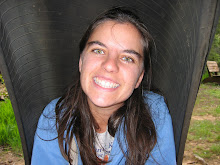[This is an excerpt from a "personal statement" I had to write as part of an application for a seminar on teaching about Asia. I wasn't really prepared to write it and had to take advantage of naptime, so it's just what came to me in the moment.]
My first foods were rice and dhal, and my first bedtime stories came from the Ramayana. I spent half of my childhood overseas, in India, Kenya, and Sri Lanka, and have since traveled to more than 30 countries. My experiences define a strong undercurrent in my teaching: I want to expand the horizons of my students and introduce them to the world they live in. It's a little simplistic to say I think this is the way to saving the world, but I kind of believe it. So many of the problems we face stem from a lack of understanding and awareness - it's easy to destroy or ignore something (or someone) you know nothing about.
When the tsunami hit in 2004, I was living in Santa Fe and teaching 7th grade Social Studies. We were studying New Mexico history that year. My students didn't usually pay too much attention to the news if it wasn't an assignment, but of course they heard about the disaster and were horrified in an abstract way. However, it didn't really mean anything to them; some of them couldn't even locate it on a world map. One day I brought in pictures of myself at their age in Sri Lanka, and suddenly it became real. These were real people who had died, lost their families, their homes, their livelihoods. We looked at maps and followed the news. Students who had never left town were engaged in the lives of people half a world away.
That kind of cultural crossover, of making someplace abstract and exotic into a reality, is powerful. I want my students to be interested, to care, to believe in the possibility that these are places they can go and people they can know. The world these kids are growing up in is changing so fast and getting smaller all the time. They can hop online and watch video taken from a cellphone in Beijing. They can follow instant updates from a kid their age in Korea. It's easier than ever to travel. While growth and technology blur borders, stereotypes and insularity are growing too.
I want to teach kids to be fascinated by other cultures, not scared of them.
Subscribe to:
Post Comments (Atom)

1 comment:
Claire,
Your e-mail address seems to be down. How do i contact you?
jr
Post a Comment